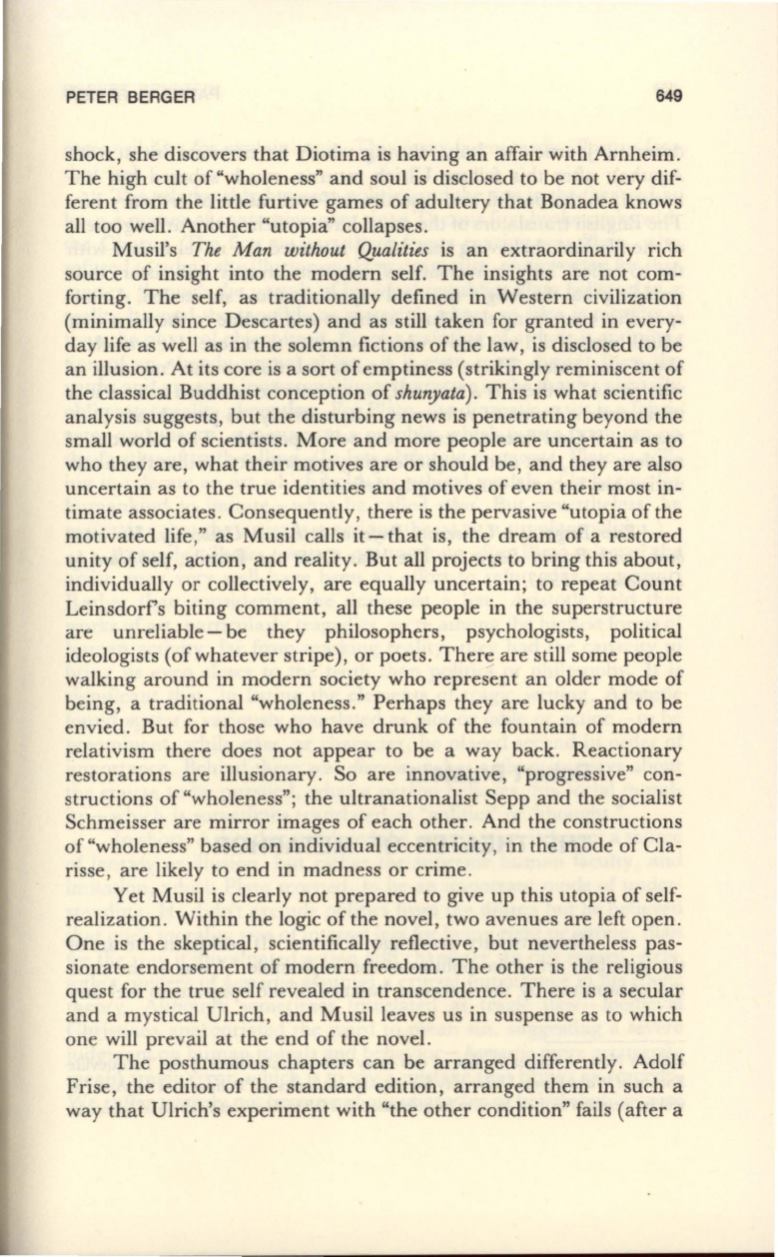
PETER BERGER
649
shock, she discovers that Diotima is having an affair with Arnheim.
The high cult of "wholeness" and soul is disclosed to be not very dif–
ferent from the little furtive games of adultery that Bonadea knows
all too well . Another "utopia" collapses.
Musil's
The Man without Qualities
is an extraordinarily rich
source of insight into the modern self. The insights are not com–
forting. The self, as traditionally defined in Western civilization
(minimally since Descartes) and as still taken for granted in every–
day life as well as in the solemn fictions of the law, is disclosed to be
an illusion. At its core is a sort of emptiness (strikingly reminiscent of
the classical Buddhist conception of
shunyata) .
This is what scientific
analysis suggests, but the disturbing news is penetrating beyond the
small world of scientists. More and more people are uncertain as to
who they are, what their motives are or should be, and they are also
uncertain as to the true identities and motives of even their most in–
timate associates . Consequently, there is the pervasive "utopia of the
motivated life ," as Musil calls it- that is, the dream of a restored
unity of self, action, and reality. But all projects to bring this about,
individually or collectively, are equally uncertain; to repeat Count
Leinsdorfs biting comment, all these people in the superstructure
are unreliable- be they philosophers, psychologists, political
ideologists (of whatever stripe), or poets. There are still some people
walking around in modern society who represent an older mode of
being, a traditional "wholeness." Perhaps they are lucky and to be
envied. But for those who have drunk of the fountain of modern
relativism there does not appear to be a way back. Reactionary
restorations are illusionary . So are innovative, "progressive" con–
structions of "wholeness"; the ultranationalist Sepp and the socialist
Schmeisser are mirror images of each other. And the constructions
of "wholeness" based on individual eccentricity, in the mode of Cla–
risse, are likely to end in madness or crime.
Yet Musil is clearly not prepared to give up this utopia of self–
realization. Within the logic of the novel, two avenues are left open.
One is the skeptical, scientifically reflective, but nevertheless pas–
sionate endorsement of modern freedom . The other is the religious
quest for the true self revealed in transcendence. There is a secular
and a mystical Ulrich , and Musil leaves us in suspense as to which
one will prevail at the end of the novel.
The posthumous chapters can be arranged differently. Adolf
Frise, the editor of the standard edition, arranged them in such a
way that Ulrich's experiment with "the other condition" fails (after a


